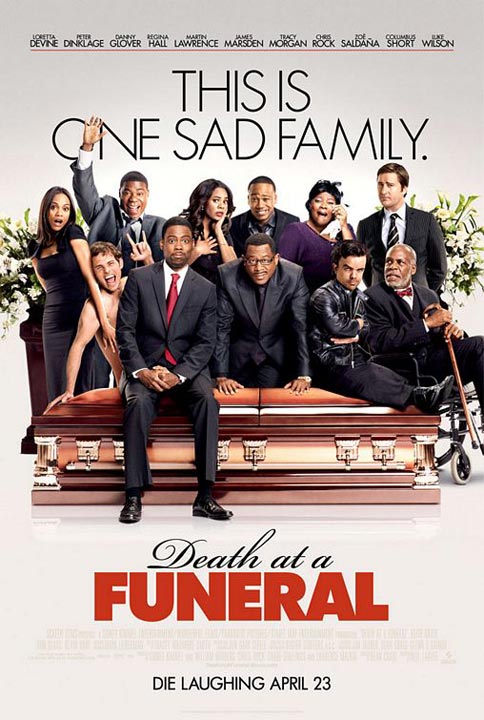Death at a Funeral
Posted on April 15, 2010 at 6:01 pm
B-| Lowest Recommended Age: | Mature High Schooler |
| MPAA Rating: | Rated R for language, drug content, and some sexual humor |
| Profanity: | Very strong language |
| Alcohol/ Drugs: | Characters inadvertantly take hallucinogenics |
| Violence/ Scariness: | Comic peril, character apparently killed |
| Diversity Issues: | Diverse characters |
| Date Released to Theaters: | April 16, 2010 |
It feels like the world should come to a stop when someone dies, but unfortunately, it does not. And it feels like the confrontation with the eternal and the shock of grief should somehow make everyone behave, but unfortunately, it does not.
Fortunately, that can be funny, especially when it is happening to someone else. “Death at a Funeral” is a wild, door-slamming, poop-on-the-face, naked-guy-on-the-roof farce set at the funeral of a man whose family did not know him quite as well as they thought. Trying to stay on top of things is the oldest son of the dearly departed, Aaron (Chris Rock), a tax accountant and would-be novelist jealous of his best-selling author brother Ryan (Martin Lawrence). The funeral is at the home that Aaron shares with his wife (Regina Hall) and mother (Loretta Devine). Arriving for the funeral are Aaron’s cousin Elaine (Zoe Saldana of “Avatar”) and her nervous fiance Oscar (James Marsden) and brother Jeff (Columbus Short), family friends Derek (Luke Wilson) and Norman (Tracey Morgan), and cantankerous uncle Russell (Danny Glover). Meanwhile, the wrong body has been delivered by mistake and there is a man at the funeral no one knows, who keeps asking to talk to Aaron about something important.
It all moves along briskly and the juxtaposition of outrageous farce with the most serious of occasions sharpens what would otherwise be pedestrian slapstick. By far the most interesting aspect of the movie is that it is an almost shot-for-shot remake of a British film by the same name, made just three years ago. The two films even share one of the lead actors, Peter Dinklage as the interloper whose relationship with the deceased — and request for payment to keep that relationship quiet — creates a lot of upheaval. Taking a farce that appeared to rely on the understated, restrained British culture in the face of outlandish situations and transplanting it to a black family in Los Angeles demonstrates how much we bring our own expectations to a film.
Director Neil LaBute, best known for searing, disturbing, often-misogynistic plays and movies (“The Shape of Things,” “Your Friends and Neighbors”) lets his able cast run with the material. Marsden is particularly good as the nervous fiance who takes what he thinks is Valium to relax and ends up alternately — and simultaneously — ecstatic, terrified, and utterly dejected. Rock, often uncomfortable on screen, finds some dignity as well as humor in a mostly straight role. Saldana, trim as a greyhound in her LBD, has some great moments as she reassures her frantic fiance and tells off her father, brother, and would-be boyfriend. Hall is delicious as always as a devoted wife who really, really wants a baby — someone needs to give her a starring role. And Dinklage is simply a hoot, one of the most able actors in films today.



